
The National Museum of Contemporary Art is an art museum located in the Chiado neighbourhood of Lisbon, Portugal. It was created in 1911 and re-inaugurated, in new installations, in 1994.
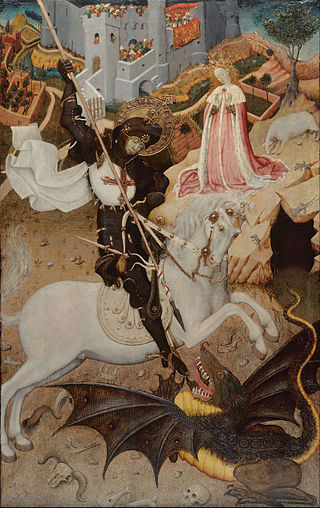
Bernat Martorell was the leading painter of Barcelona, in modern-day Spain. He is considered to be the most important artist of the International Gothic style in Catalonia. Martorell painted retable panels and manuscript illuminations, and carved sculptures and also provided designs for embroideries.

Royal Monastery of Santa María de Sigena is a convent in Villanueva de Sigena, region of Aragon, Spain. Built between 1183 and 1208, the Romanesque church was founded by Queen Sancha of Castile, wife of Alfonso II of Aragon.
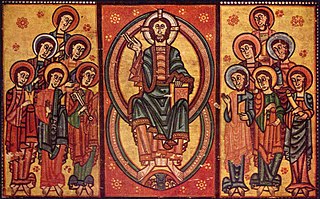
The Altar frontal from La Seu d'Urgell or of The Apostles is a Romanesque altar frontal currently exhibited at the National Art Museum of Catalonia. The work dates from the second quarter of the 12th century and comes from a church of the Bishop of La Seu d'Urgell and was acquired in 1905. It is one of the masterpieces of the collection of panel painting of the MNAC. The frontal, the item covering the front of the altar, stands out for the quality of its bright colours and because it illustrates some of the characteristics of composition in Romanesque art, such as bilateral symmetry, abstraction of the background, with no reference to space or context, and the unnatural geometrical treatment of form to be observed in the folds of the clothing. It also shows certain conventions of representation, such as so-called hierarchical perspective, which consists in representing the chief character in a larger size.

The Southern apse from Pedret is a Romanesque fresco painting from late 11th century or the beginning of the 12th century, which was acquired during the 1919-1923 campaign of the Junta de Museus. The artwork originated from the southern apsidiole of the Church of Sant Quirze de Pedret and is currently exhibited in the Romanesque Art collection at the Museu Nacional d'Art de Catalunya, in Barcelona, Spain.
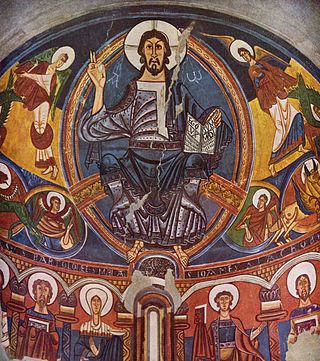
The Apse of Sant Climent de Taüll is a Romanesque fresco in the National Art Museum of Catalonia, Barcelona. The fresco is one of the masterpieces of the European Romanesque, from which the unknown Master of Taüll takes his name. It was painted in the early 12th century in the church of Sant Climent de Taüll in the Vall de Boí, Alta Ribagorça in the Catalan Pyrenees. The mural covered the apse of the church. In 1919-1923 it was moved, along with other parts of the fresco decoration, to Barcelona, in an attempt to preserve the murals in a stable, secure museum setting.

The Virgin of the Angels is a painting by Pere Serra conserved at the National Art Museum of Catalonia.
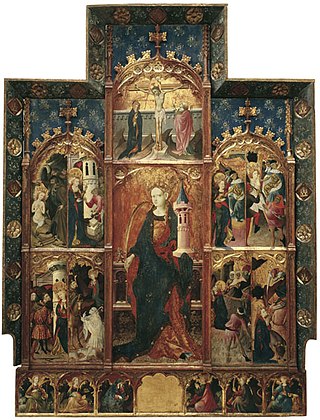
The Altarpiece of Saint Barbara is a painting by Gonzalo Pérez in the Museu Nacional d'Art de Catalunya in Barcelona.
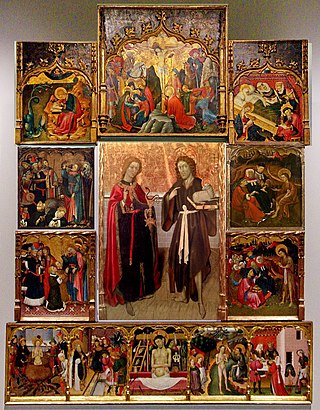
The Altarpiece of the Saints John is a painting by Bernat Martorell conserved at the National Art Museum of Catalonia.
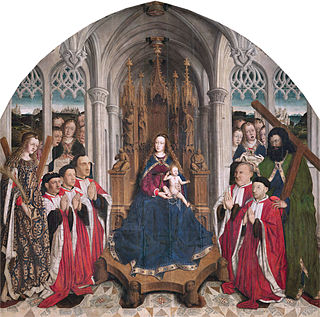
The Virgin of the Councillors is a panel painting in oils by Lluís Dalmau now in the National Art Museum of Catalonia in Barcelona. It was commissioned in 1443.
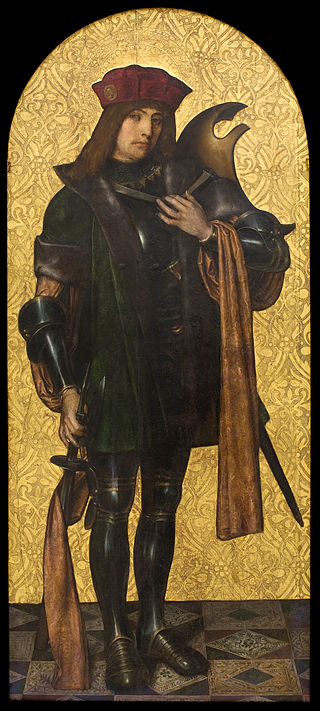
Saint Candidus is a painting by Ayne Bru conserved at the National Art Museum of Catalonia.

The Jean-Claude Richard, Abbot of Saint-Non, Dressed à l'Espagnole is a painting by Jean-Honoré Fragonard conserved at the National Art Museum of Catalonia, in Barcelona, from c. 1769.

Saint Peter and Saint Paul is a painting by the Cretan-Spanish artist El Greco. The work was completed between 1590 and 1600. It is currently on display at the Museu Nacional d'Art de Catalunya, who purchased the work in 1932.

The Mural Paintings from the Herrera Chapel is group of mural painting by Annibale Carracci and collaborators, conserved between the National Art Museum of Catalonia and de Museo del Prado.

The Altar frontal from Tavèrnoles is Romanesque altar frontal exhibited at the National Art Museum of Catalonia in Barcelona.

The Paintings from Sant Joan in Boí is a group of Catalan Romanesque paintings exhibited at the National Art Museum of Catalonia in Barcelona.
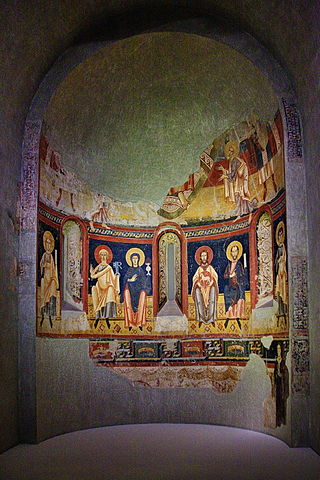
The Paintings from El Burgal is group of paintings exhibited at the National Art Museum of Catalonia in Barcelona.

The Apostles from Àger is a painting created in the late 11th century or early 12th century, currently exhibited at the National Art Museum of Catalonia in Barcelona.

The Odalisque is a painting by Marià Fortuny exhibited at the National Art Museum of Catalonia in Barcelona.

The Paintings from Santa Maria in Taüll are a set of frescos conserved at the Museu Nacional d'Art de Catalunya, in Barcelona.





















